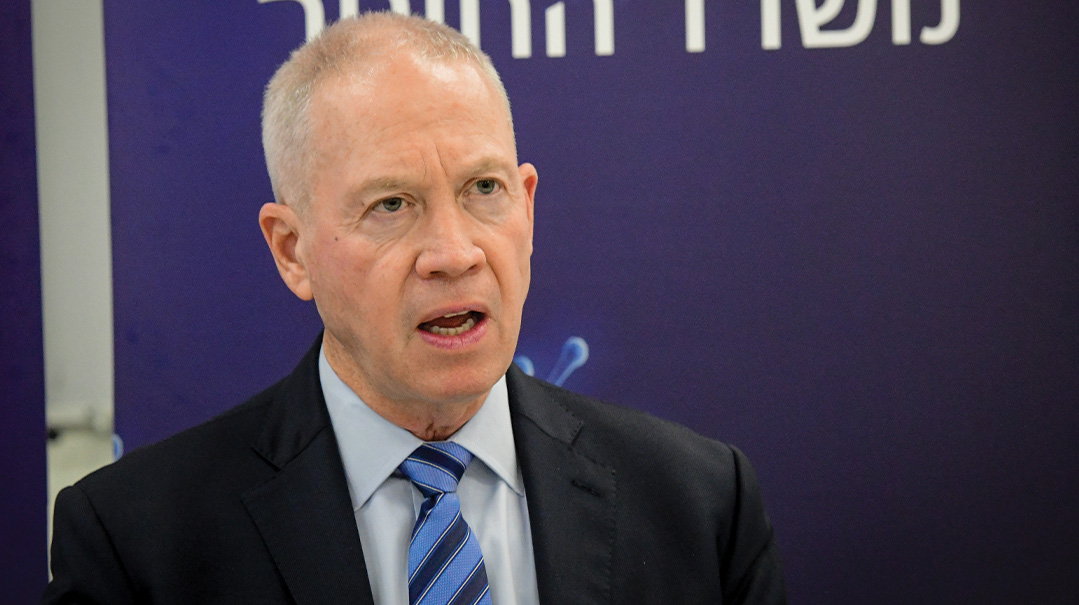A Few Minutes with… Yoav Galant
| August 9, 2022Yoav Galant is a former naval commando who was nominated for IDF chief of staff, only to be passed over for Benny Gantz

Photo: Flash 90
Likud MK Yoav Galant is a worried man. A retired major general who formerly headed up the Southern Command, and as a politician who headed up the ministries of Education, Construction, and Immigration, Galant is worried about what’s happening in Israel’s south, about what’s happening in the north, and in recent days, about the developing crisis with Moscow.
Two weeks ago the Kremlin announced its intention to shut down Jewish Agency operations in Russia, with some analysts saying the move came in response to caretaker prime minister Yair Lapid’s vocal condemnation of the Ukraine invasion when he was foreign minister. Even the Israeli legal delegation dispatched to resolve the crisis was denied entrance to Russia for days.
Yoav Galant, a former naval commando who was nominated for IDF chief of staff, only to be passed over for Benny Gantz, pins the entire blame for the affair on Lapid. When circumstances demanded a diplomatic choice of words, Galant charges, Lapid as foreign minister supplied exactly the opposite. In conversation with Mishpacha, Galant forcefully called for Lapid’s defeat in the upcoming election, and strongly defended his party’s leader, Binyamin Netanyahu.
To what do you attribute the Kremlin’s decision to close down the Jewish Agency in Russia?
“This testifies to the recklessness with which Yair Lapid is running the country. Lapid made the first mistake as foreign minister, and now as prime minister, he not only refuses to walk it back, but continues adding one mistake after another, without seeking advice — even from Bennett — and without vetting every move. This is why out of nowhere, he’s found himself in a showdown with a world power whose ties with us are vital in every respect.
“The mistake stems from one thing — from putting his political and PR interests over the good of the country. It stems from a failure to understand the weight of the government’s responsibility. We’re talking about a man with no experience, an amateur who’s treating the whole subject with immaturity and a lack of seriousness. So yes, Lapid’s provocation occurred when he was foreign minister, but at that point the Russians didn’t respond. They don’t react from the gut. Now we’re beginning to see the Russian response, and we can see the results.”
And what will be the consequences of this, in your view?
“We’ll see it on two major fronts. First, we have to retain our freedom of action in the northern sector, on the Syrian front, where the Russians are also actively involved. The moment we lose our freedom to act in Syria, just because we provoked the Russians unnecessarily, we’ll pay a very heavy price.
“Second, the Jewish state has to be able to help every Jew in Russia and Ukraine. For this, we have to maintain functional relationships with both Russia and Ukraine. The condemnation of Putin contributed nothing to our standing in the international arena, and we’re feeling the drawbacks already. Sadly, we’ll soon see Israeli strikes in Syria being blocked, and this in addition to what we’re already seeing now — the blocking of Jewish Agency activities in Russia, something with very serious ramifications.
It seems astounding that such far-reaching effects are due to one diplomatic misstep.
“The idiocy of it is that even now, everyone can see the mistake. The petulant child sitting in the prime minister’s chair continues to behave that way, without understanding the responsibilities of the job. After all, the prime minister of Israel is responsible for the security of the State of Israel and the future of the Jewish People.
“This conduct diametrically contradicts the essence of the post. I’ve been involved in this sphere for over 20 years, going back to when I served as Sharon’s military secretary. I met Putin both in Israel and in Moscow. I watched a close relationship budding between President Putin and the State of Israel, first under Sharon, and later under Netanyahu, who had the acumen to get close to the Russians and turn them from anti-Israel to pro-Israel. In his meetings with Netanyahu, Putin used to talk about his childhood and his attachment to Jewish families. And now, with inexplicable recklessness, Lapid is turning Putin from friend to foe.”
But isn’t it our duty to condemn the bloodshed in Ukraine?
“No, and again, no. This is a European affair, it has nothing to do with Israel. We’re not an actor in this theater, and we have no business meddling in it. Even Bennett’s trip to mediate between the sides was a misjudgment, because when you step into this field, you can’t not take a side, and by siding with either party, we would be playing a dangerous game that could harm the country.
“What surprises me the most is the media’s silence. Even as we watch decades of work going down the drain, our enormous diplomatic achievements with Russia simply melting away, the media is busy with what the 70th candidate on the Likud list said. This shows a fundamental misreading of the situation. Russia is a power to be reckoned with, despite the international situation in the context of the war. Russia’s an extremely influential actor and we can’t afford to confront it.”
Is there a strategic dimension for Israel on the closing of the Jewish Agency in Russia?
“Let’s not forget, this country was built as a home for the Jewish People and as a center for kibbutz galuyot. The agency’s mission is to bring here Jews from every corner of the globe, and thus to prevent assimilation and strengthen Am Yisrael.”
Let’s switch to Iran. At this point it seems everyone wants a revised nuclear deal except Tehran. The clock is ticking, but the Iranians don’t seem too keen on signing it. They’re dragging out the talks and in the meantime they continue to race to the nuclear threshold. Is the Biden administration going about it in the right way?
“I’ve been familiar with the Iranian issue for decades. As Sharon’s military secretary, I was put in charge of this case, and I was the one who did the administrative work in concert with the military intelligence directorate and the Mossad.
“Sharon in his time sent me to meet President Bush, and I showed him the intelligence we had gathered on Iran’s nuclear facilities.
“Later, as a government minister during the Obama and Trump administrations, I saw how sanctions were bringing the Iranians to their knees. The economic blow caused them serious problems. Both in general and in terms of their nuclear program. Now, lifting the sanctions will put them in an entirely new position.”
The Americans will say the sanctions made no difference, Iran’s nuclear program continued.
“This is like the case of a doctor who tells his patient to take antibiotics for 14 days. Two days later, the patient stops taking the antibiotics, because he can’t feel them working. The sanctions clearly did help, but it’s true that their impact will remain limited if they aren’t continued. We have to exploit the sanctions to the full and maintain them, and not give the Iranian menace breathing room.”
But at least Bennett and Lapid stayed on the same page as the US, unlike Netanyahu, who got crossways with Obama.
“The Israeli government under Bennett and Lapid made a serious error. First, they promised to coordinate any military action with the Americans. This is a serious mistake, because under our government, we sometimes informed the Americans, and sometimes we only did so after the fact — but we weren’t bound to warn the Americans in advance, because Israel has strategic interests relating to its security that take precedence even over our ties with the US.
“The second mistake was the commitment to not publicly oppose the administration. This is a mistake, because Netanyahu gave a speech to Congress, and while his arguments were rejected under Obama, they were adopted by Trump not long after.”
But now we’re at the same point again. Maybe this deal is better than no deal?
“As of now, the deal being offered to the Iranians is dangerous. It provides them with legitimacy to continue their nuclear program, which is a threat to the entire world, and the most remarkable thing about the deal is that there’s no monitoring. If IAEA inspectors want to visit a particular facility, they’ll have to provide advance warning. This is not oversight. This isn’t a deal. This is buying a little bit of time for an unacceptable price. The main problem is that lifting sanctions will allow billions of dollars to flow into Iran’s pockets, money it will use to step up terrorist sponsorship around the globe.”
Let’s talk politics. What happens if Netanyahu doesn’t get 61 seats? Would you say it’s time for him to step down?
“The question is completely inappropriate. No one has the right to decide who leads the Likud besides party members. Just as I don’t ask Lapid to step down as chair of Yesh Atid to make room for [Speaker of the Knesset] Mickey Levy, or Gantz to hand over the reins to [MK Alon] Schuster, they shouldn’t meddle in our party.
“It’s chutzpah to dictate to the one party that chooses its leader democratically. After all, Lieberman and Lapid, Gantz and Saar dictate the makeup of their list, and whoever dares dissent is done away with — see Ofer Shelach and Yoaz Hendel. So I expect them to stay away and not interfere in the makeup of our list.
But isn’t Netanyahu responsible for the impasse we find ourselves in? He had four elections and he couldn’t assemble a stable coalition.
“To come to heart of the matter, those who have brought Israel to the current political crisis are the ones who boycott other parties. Because if you categorically rule out the other side, two things happen. One, every MK raises his price, because 61 seats are critical. And two, you can’t create alliances. For this reason, it’s just not up for debate. And this is the secret of the Likud’s greatness, that it stands by its leader instead of knifing them the moment things go wrong, the result being that we’ve had five leaders in the movement’s history and four in the history of the state, all of them men of stature with principles and a vision.
“I don’t mind spending a few years in the opposition, and I won’t think for a moment of letting outsiders decide who leads my party.”
(Originally featured in Mishpacha, Issue 923)
Oops! We could not locate your form.







